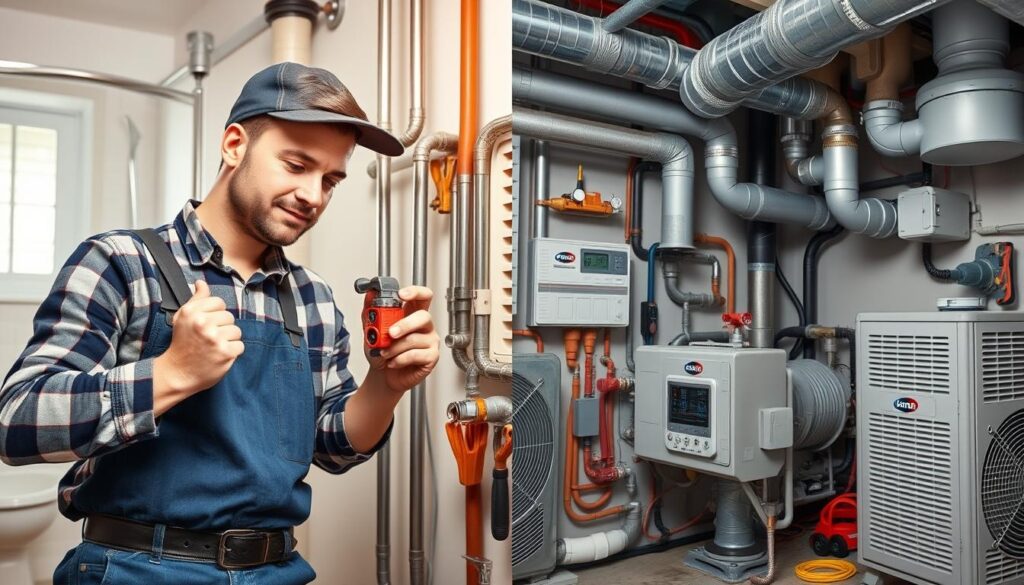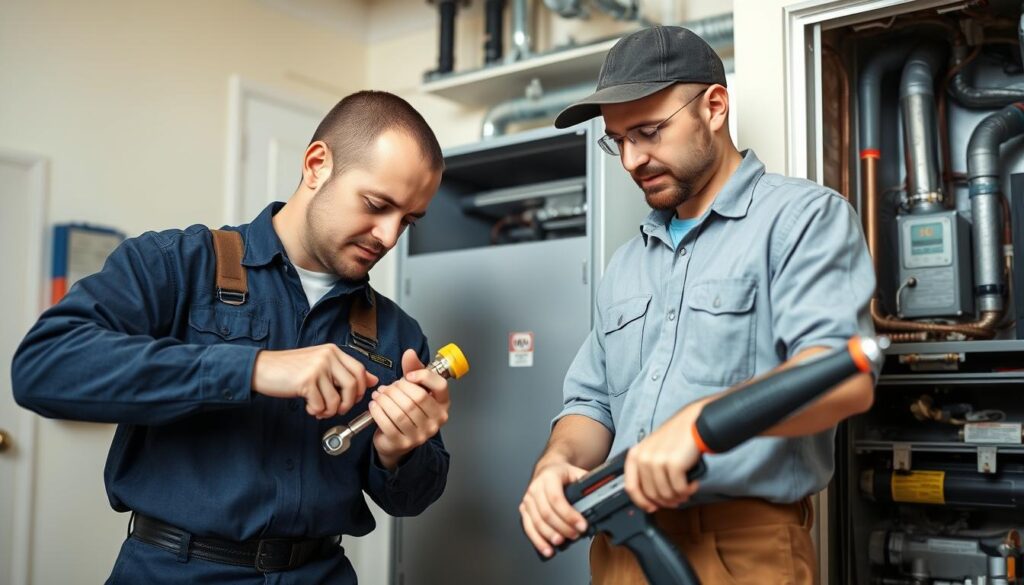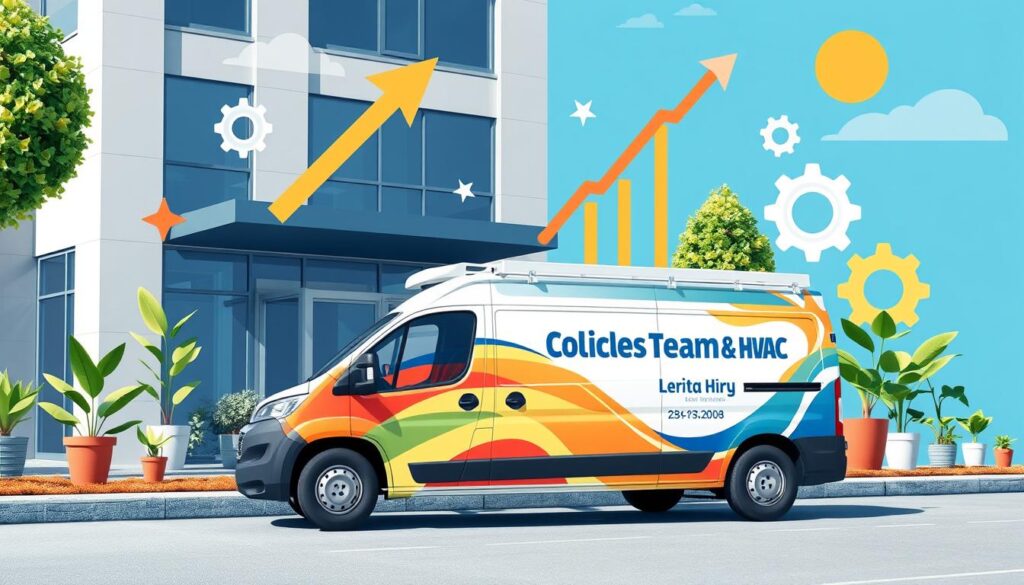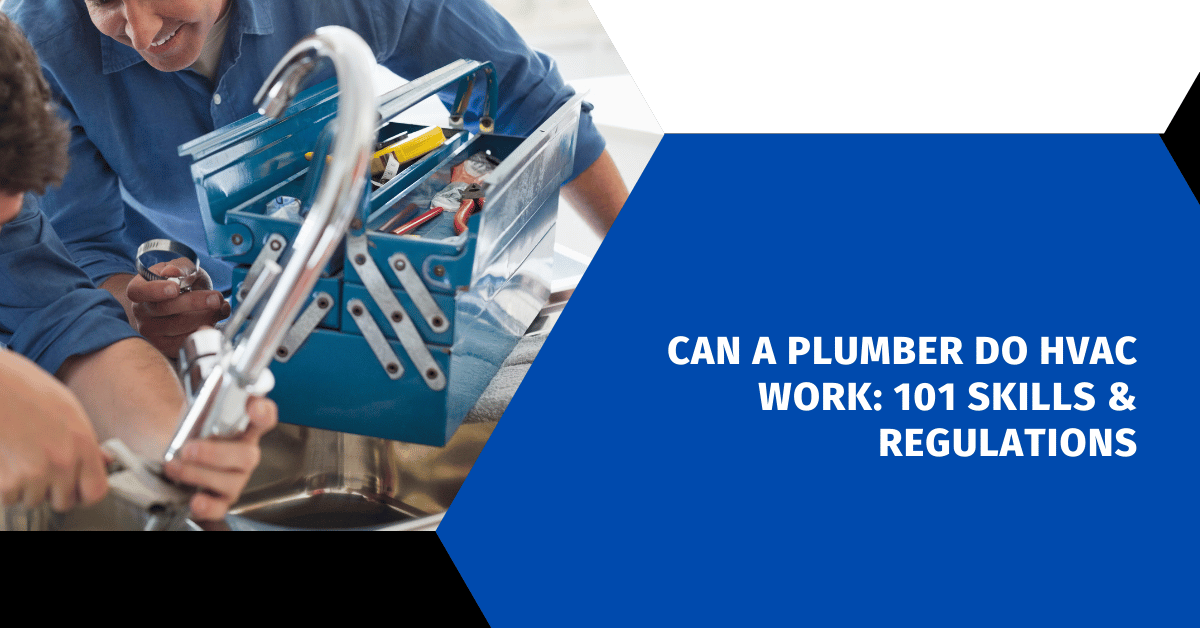Can A Plumber Do HVAC Work? Many professionals are now exploring different trades to grow their skills. Plumbers, for example, can boost their careers by getting HVAC certification. But, can plumbers really do HVAC work? What skills and rules do they need to follow?

Key Takeaways
- Plumbing and HVAC share common components and technical similarities, allowing for cross-training opportunities.
- Specific licensing and certification requirements vary by state, with some allowing plumbers to perform HVAC work and others requiring separate licenses.
- Essential skills for cross-trade work include technical knowledge, physical capabilities, problem-solving, and safety awareness.
- Combining plumbing and HVAC skills can lead to expanded career options, increased income potential, and business advantages.
- Proper education, training, and adherence to state regulations are crucial for plumbers seeking to expand their HVAC expertise.
Table of Contents
Understanding the Overlap Between Plumbing and HVAC Systems
Plumbing and HVAC systems work together well, sharing parts and skills. Knowing where they meet is key for those wanting to offer more services. This helps clients get a full range of solutions.
Common Components and Shared Systems
HVAC experts manage ductwork and vents, making sure they work right. Plumbers, meanwhile, focus on attic vent work, working with others to get it done right. This teamwork is vital for projects that need both HVAC and plumbing.
Technical Similarities in Both Trades
HVAC techs usually don’t handle gas pipes, but plumbers or pipe fitters do. Plumbers also move plumbing and vents, following local rules and getting the right permits. This overlap means both trades can work together, making sure everything is installed correctly.
Water Heaters and Hydronic Systems
Water heaters and hydronic systems are where plumbing and HVAC meet. It’s important for HVAC and plumbing to work together for these systems to work well. This teamwork helps ensure everything runs smoothly and efficiently.
Working together, HVAC and plumbing pros make sure systems work well together. They follow local codes and improve home performance. This teamwork leads to better home maintenance and system integration for clients.
Explore Our HVAC Shop
Looking for top-rated HVAC tools, parts, and accessories? Visit our shop and find the perfect solution for your needs.
Visit the ShopCan a Plumber Do HVAC Work: Legal Requirements and Limitations
Plumbers entering the HVAC field face a maze of licensing, regulations, and state requirements. These legal constraints are key to ensuring HVAC systems are safe and work well. They are vital for our comfort and health indoors.
Rules differ greatly from state to state. For example, in Alabama, HVAC workers need an apprenticeship certificate, course transcripts, or 18 months of experience to take the exam. In Alaska, the Mechanical Administrator license has different HVAC categories with their own rules. Arizona requires four years of HVAC experience or two years plus a course or apprenticeship.
In other states, the licensing and certification rules are just as complex. California demands at least four years of HVAC experience in the last 10 years. You also need to pass a business and law exam and show a $25,000 contractor license bond. Connecticut has 21 HVAC license types, requiring a registered apprenticeship or equivalent and passing an exam.
Plumbers must understand these state-specific regulations and legal requirements to work in HVAC. Knowing these rules helps them stay compliant, avoid risks, and open up new career paths.
Essential Skills Required for Cross-Trade Work
Being a multi-skilled tradesperson means you can work on both plumbing and HVAC systems. You need technical expertise, physical strength, and great problem-solving skills. These are key to handling the challenges of cross-trade work.
Technical Knowledge and Expertise
Professionals must know a lot about plumbing and HVAC systems. They need to understand water heaters, hydronic systems, and the common parts of both trades. Keeping up with new tech, like smart irrigation systems, is also important for efficient solutions.
Physical Requirements and Safety Awareness
Cross-trade work can be tough, like installing heavy equipment. Knowing safety protocols well is crucial to keep everyone safe. Training in electrical work, confined spaces, and handling hazardous materials is vital for a safe job site.
Problem-Solving and Diagnostic Abilities
Being able to find and fix problems in both plumbing and HVAC systems is important. Skilled multi-trade professionals use their knowledge in both areas to solve complex issues. They need to think critically, pay attention to details, and solve problems step by step.
“Getting licenses in multiple trades, like plumbing and HVAC, can open up more job chances and higher pay. Being able to work on many types of equipment and offer complete solutions is very valuable in the field.”
Explore Our HVAC Shop
Looking for top-rated HVAC tools, parts, and accessories? Visit our shop and find the perfect solution for your needs.
Visit the ShopEducation and Training Pathways for Dual Certification
People wanting to be certified in both plumbing and HVAC have many options. They can choose from vocational schools, apprenticeships, and continuing education. These paths help you get the skills and qualifications you need.
The Associated Builders and Contractors of Indiana Kentucky offer an apprenticeship. It’s a program that mixes hands-on training with classroom learning. To stay in the program, you need to get at least a “C” in each technical class.
Community colleges and technical schools also have great programs. They cover HVAC and plumbing in depth. You’ll learn about things like blueprint reading and industrial safety. To move forward, you must get a “C” or better in your classes and keep a 2.0 GPA.
After finishing these programs, you can get different certifications. For example, you might become an Environmental System Repair Helper or a Certified Backflow Tester. Some certifications require passing a written test and a practical assessment.
The need for skilled workers in HVAC and plumbing is growing fast. HVACR jobs are expected to increase by 34% by 2020. This means lots of job opportunities and good pay for those with dual certification. You can work in many places, from homes to big buildings.
“Graduates of HVACR programs may work in general service or specialize in fields like residential air conditioning, commercial refrigeration, or heating equipment.”
By looking into apprenticeships and continuing education, you can get ready for the plumbing and HVAC fields. These paths help you build the skills you need to succeed.
Explore Our HVAC Shop
Looking for top-rated HVAC tools, parts, and accessories? Visit our shop and find the perfect solution for your needs.
Visit the ShopLicensing and Certification Requirements by State
Licensing and certification for HVAC work differ across states. If you’re a plumber looking to get into HVAC, knowing the local rules is key. These rules cover everything from exams to ongoing education.
In Alabama, HVAC Technicians don’t need a license, but Contractors must post a $15,000 bond. Alaska requires Technicians to pass an exam and have experience. Contractors need a Mechanical Administrator license and meet specific qualifications.
Arizona demands that Contractors have four years of experience and pass certain exams. They also need a surety bond. In Arkansas, Technicians don’t need a license, but Contractors must pass an exam and have two years of experience.
Across the country, the rules for state licenses, insurance requirements, and liability protection for HVAC pros vary a lot. Plumbers looking to expand their services must research and follow the rules in each state they plan to work in.
Continuing Education Requirements
Many states require HVAC pros to take ongoing continuing education. This keeps them updated on the latest in the field. The number of hours needed varies, so plumbers need to know the rules in their state.
Insurance and Liability Considerations
Having the right insurance coverage and liability protection is crucial for HVAC pros. The work can be complex and involve dangerous materials. Plumbers moving into HVAC must check their insurance needs to protect themselves and their clients.
Understanding HVAC licensing and certification rules can be tough for plumbers. But, it’s vital for offering top-notch, compliant services. By knowing the regulations, plumbers can thrive in the HVAC industry.
Benefits of Combining Plumbing and HVAC Skills
Learning both plumbing and HVAC can open up many career doors. It boosts your value and job chances. You can also offer more services to your clients.
Being skilled in both areas lets you fix a wide range of problems. From pipes to HVAC systems, you’re ready for anything. This makes you very valuable in your field.
With these skills, you’ll find more job security. You can offer a comprehensive service that clients love. They appreciate the ease of working with one expert.
Also, your versatility can lead to better pay. Employers and clients will pay more for your skills. This opens up doors to higher-paying jobs and even starting your own business.
| Skill | Average Salary (2023) | Job Outlook (2032) |
|---|---|---|
| Plumber | $67,840 | 2% increase |
| Electrician | $67,810 | 6% increase |
| HVAC Technician | $59,620 | 6% increase |
Choosing to learn both plumbing and HVAC can change your career. You’ll have more job chances, earn more, and offer complete services. It’s a smart move for your future in the trades.

“I’ve been a Cates customer for over 20 years, and the team’s efficiency and professionalism in resolving HVAC issues have always impressed me. The technicians, like Derek, Jeff, and Greg, are knowledgeable and provide excellent service.”
Explore Our HVAC Shop
Looking for top-rated HVAC tools, parts, and accessories? Visit our shop and find the perfect solution for your needs.
Visit the ShopCareer Opportunities and Income Potential
Getting certified in both plumbing and HVAC (Heating, Ventilation, and Air Conditioning) opens many doors. People with these skills can work in service companies, start their own businesses, or focus on specific areas. They can also look forward to career advancement and higher income potential.
Service Company Positions
Service companies love plumbers who know HVAC too. They can fix many problems, from plumbing to HVAC. This skill often means better pay and job security, as they can meet all their clients’ needs.
Self-Employment Options
Those with both plumbing and HVAC skills can do well on their own. They can serve more clients and earn more money. This is especially true as more businesses look for energy-saving solutions.
Specialization Areas
In HVAC, there are many specialization areas for growth and more money. Plumbers and HVAC experts can focus on things like refrigeration or air quality. Their broad knowledge lets them offer unique solutions and earn more.
Plumbing and HVAC need a complete problem-solving approach. Those with both skills can offer full solutions. This makes them more valuable, leading to more job chances, security, and better pay.
Business Advantages of Offering Both Services
Expanding your skills to include HVAC work can greatly benefit your business. By offering plumbing and HVAC services, you can open up new revenue streams. This also helps keep clients coming back and gives you a competitive edge.
Being able to expand your service offerings is a big plus. Many homeowners want one contractor for all their needs. This means you can offer more complete solutions, making you more valuable to clients and potentially leading to better-paying jobs.
Also, offering more services can enhance client retention. When customers know you can handle all their home needs, they’re more likely to stick with you. This leads to a stable and growing business.
Moreover, the specialized skills for HVAC work can make you stand out. Clients might be willing to pay more for a contractor who can handle both systems. This gives you a competitive advantage.
Investing in HVAC training and certification can make your business a go-to for all needs. This drives business growth and boosts your profits.

“Plumbers who acquire HVAC certification can substantially enhance their professional value, leading to increased service demand, job security, and income potential.”
Conclusion
Cross-training in plumbing and HVAC is a smart choice for those looking to grow their careers. These trades work well together, especially with the need for energy-saving solutions. Getting certified in both can lead to more job opportunities and career advancement.
HVAC and plumbing experts with a wide range of skills will thrive in the changing job market. They can provide a full range of services to homes, businesses, and factories. This makes them valuable to many clients.
Getting trained in both areas can lead to better job prospects. You might earn more or even start your own business. By keeping up with industry changes, you become a sought-after professional in the construction and maintenance fields.

